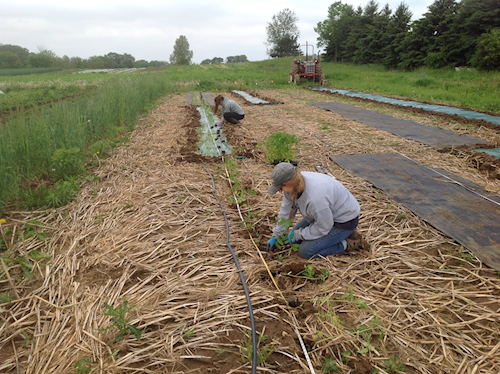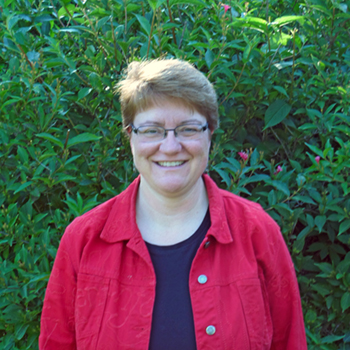

Kathy Kuntz
Climate change is already impacting organic vegetable farmers in our area according to Claire Strader, Organic Vegetable Educator for Dane County Extension.
Strader should know. A former organic farmer herself, she currently works with organic vegetable farmers across Dane County. Stader also works with FairShare CSA Coalition. FairShare is a coalition of 45 organic farms offering Community Supported Agriculture or CSA shares across Wisconsin and neighboring states. (CSA is a model where consumers can buy a share in a particular farm and then receive boxes of produce throughout the growing season. As a long-time CSA member, trust me, it rocks.)
Climate change is not a new topic for organic vegetable farmers. These farmers tend to be more politically progressive than traditional dairy or corn and soybean farmers, and the organic farmers have been talking about climate change for years.
According to Strader, what’s new is that climate change is now affecting the business model for some farms. In the last year two farms that had long offered CSA shares decided to stop offering shares and a third farm made major changes to their CSA offerings because climate change is making it harder for them to offer customers the diversity of vegetables that CSA members expect.
A little more background on how a CSA works might be useful here. When you buy a CSA share you are investing in the farm, signing up to get a portion of the farm’s bounty. A typical CSA share like mine runs from early June through late September; our CSA boxes are filled with whatever is ripe in a particular week. Early boxes include radishes and a lot of greens whereas late summer boxes have tomatoes, peppers and melons. Part of the fun of a CSA is the variety—I discovered that I love raw fennel thanks to my CSA. And another benefit is the predictability—I appreciate knowing we’ll have fresh broccoli and carrots, followed later by sweet potatoes and that we’ll see a variety of onions all season long.
How does climate change affect this? According to climate experts our region is getting warmer and wetter due to climate change. Significantly, on the precipitation side, we are seeing more big rain events.
Those big rain events are wreaking havoc on certain root vegetable crops—crops like carrots, potatoes, and sweet potatoes. The heavy rainfall makes is harder to plant, weed and harvest all crops but it is especially problematic for root crops. Indeed, the rainfall is problematic enough that a few farmers have already decided that they can’t assure CSA members access to a diverse set of produce so they are dropping their CSA programs. Rather than disappoint customers, the farms will focus on growing fewer vegetables and selling that produce via farmers markets or to other sources.
The shift away from diversity and CSA offerings is not without risk. Historically growing a diverse set of vegetables has been a way for organic vegetable farmers to manage risks. It might be a great year for broccoli even if the tomatoes are not that great, for example. As our climate changes, though, these farmers have access to less diversity, which increases the risk associated with other weather events, insects and disease. Increased rainfall even makes it harder to weed organic farms.
So what is an organic vegetable farmer to do? (And what about all of us who rely on these farms for a diverse bounty of fresh vegetables?)
Strader is working with farmers and UW researchers to identify ways to adapt to the changing climate. Their focus right now is on reduced tillage strategies. Reduced tillage is a popular strategy with corn and soybean farms but it is more complicated on organic vegetable farms. Organic farmers pull out or dig up weeds (rather than using pesticides) and they need to dig out root vegetables—all of which is tillage. Still, the group is experimenting with climate resilient strategies via a collaborative model where farms host experiments led by UW researchers and also do their own experiments assisted by the researchers. While the COVID-19 pandemic slowed some of the official UW research activities, farmers have continued to experiment on their own, sharing results across a community of practice. The group even has a website where they share insights.
There is a strong sense of community among organic vegetable farmers. Strader notes that there is a long tradition of farmers learning from each other and sharing best practices. By helping those farmers connect with UW researchers, Strader is enabling individual insights to be analyzed and verified. All of that enables the most effective practices to spread more quickly, which increases the likelihood that more organic vegetable farmers can continue to offer the magnificent summer bounty we have grown to expect in Wisconsin, despite climate change.
Climate change is already affecting Dane County; it is good to know our local farmers are collaborating with Extension and UW staff on climate resilient strategies.

Kathy is the Acting Director in the Dane County’s Office of Energy and Climate Change. In that role she's leading efforts to implement the Climate Action Plan. Prior to coming to Dane County, Kathy led Cool Choices and, prior to that, she led Wisconsin's Focus on Energy program.
The Dane County Office of Energy & Climate Change maintains this blog as a way to offer:
To be sure that you don't miss new blog entries, subscribe to our email updates.